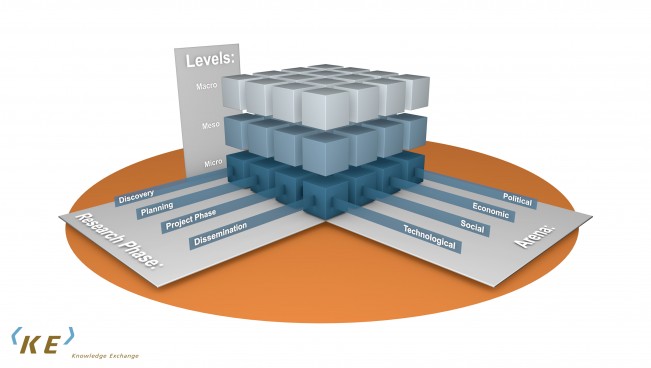The Knowledge Exchange Open Scholarship Framework
Input from experts in several KE events and work done by the KE Open Scholarship Advisory Group (KEOSAG) culminated in the report Knowledge Exchange Approach to Open Scholarship (2017). The report presented the KE Open Scholarship framework, which maps considerations for Open Scholarship across three dimensions.
The first dimension addresses the level of granularity (scale) of actors; the second dimension is the phase of the research (e.g. Discovery, Planning, Project, Dissemination); and the third dimension is the arena (Political, Economic, Social, Technological).
How the framework works
The KE OS framework gives us 3 levels of scale, 4 phases and 4 arenas, a 3 x 4 x 4 categorisation allowing us 48 'places' to characterise or categorise activities, discussion topics, proposals and more.
The KE OS model materialises this framework in a visual representation and provides opportunity to expose, explode and explore the model in a number of ways. For example, to examine the levels of scale separately or to examine a particular arena on its own. Entire 'slices' of the model can be examined to look at relationships between components of that slice. Discussion of where issues fit in the framework can clarify different views of the issues themselves.

How the framework helps
The framework helps us to focus on issues such as "Where does this particular service or piece of infrastructure fit?" and "When we use a particular term are we talking about the same thing?". It can also help us to identify discrepancies in ambitions, objectives and perceived benefits regarding Open Scholarship by different stakeholder groups. It acknowledges the influence of not only the technological arena but also the political, social and economic arenas on Open Scholarship issues. The framework supports looking at Open Scholarship in a broader and more complex and challenging context.
A useful tool
The framework was successfully used to aid discussion and identification of topics and issues to be explored by KE. As a result KE has been working on the Economy of Open Scholarship with both a conceptual angle (through our forthcoming report 'Open Scholarship and the need for Collective Action') and a practical approach, through our work 'Insights into the Economy of Open Scholarship'. We also work on Research(er) Evaluation, developing the so called Openness Profile.
We will continue to use the Open Scholarship Framework to inform direction and issues relating to new KE activities and hope the framework will prove a useful tool for others as well.






